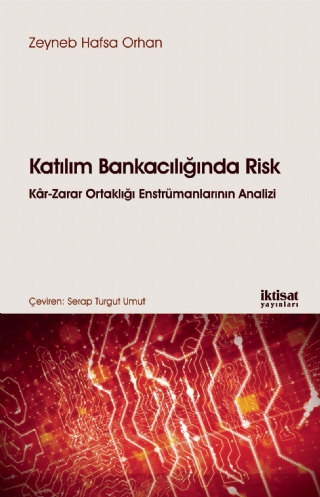ECONOMICS PUBLICATIONS \ 1-1

In this book, which is the eighth book in the "What You Need to Know in 40 Questions" series of books that provide short, practical and qualified answers to the questions of the reader about the practices or institutions related to Islamic economics, the subject of interest is discussed around 40 questions from various aspects. One of the main issues of the universal message sent by Allah (c.c.) to humanity is the prohibition of interest/riba. Because, interest is a practice that brings with it many harms, vices and evils in terms of religion, morality, social and economic aspects. The book deals with such an important subject as a whole; It has covered a wide area from its history to its implementation and the systems and discourses formed around it.

In this work, which is the first book in the "What You Need to Know in 40 Questions" series, consisting of books that provide practical, short and qualified answers to the questions of the reader about the practices and institutions in Islamic economics, information about Islamic banking in the world and the basics of the system known as participation banking in our country is presented in a theoretical way around 40 questions. It is given in a format that can be easily understood by people of all levels, rather than depth.
While determining the 40 questions in this book, it has been given importance to include all possible aspects of understanding participation banking and to take into account personal and social experiences with the questions asked so far. During the preparation of the answers to the questions, the experiences, thoughts and concerns of the individuals working in the sector, especially individual customers who have contact with participation banking, as well as the information obtained from the instructors and written materials were taken into account. In order not to tire the reader, a maximum of 400-500 words of explanation is given for each answer. In order to better understand the explanations, figures and figures were used where deemed appropriate. The main feature that distinguishes the book from the existing literature is that the segment it addresses is wider.
While determining the 40 questions in this book, it has been given importance to include all possible aspects of understanding participation banking and to take into account personal and social experiences with the questions asked so far. During the preparation of the answers to the questions, the experiences, thoughts and concerns of the individuals working in the sector, especially individual customers who have contact with participation banking, as well as the information obtained from the instructors and written materials were taken into account. In order not to tire the reader, a maximum of 400-500 words of explanation is given for each answer. In order to better understand the explanations, figures and figures were used where deemed appropriate. The main feature that distinguishes the book from the existing literature is that the segment it addresses is wider.

In this book, which is the seventh book in the "What You Need to Know in 40 Questions" series of books that provide short, practical and qualified answers to the questions of the reader about the practices or institutions related to Islamic economics, the subject of murabaha is handled around 40 questions from various aspects.
Murabaha contract is the type of contract that is mostly applied in the interest-free banking sector, which has been operating in different countries of the world since the 1970s, and largely determines the direction of the interest-free operation. In this context, examining the historical development, stages, problematic points and discussions of such a process will provide the reader with an important background in the field of Islamic economics and especially modern contracts. The questions addressed not only focus on the practical aspects of murabaha, but also aim to reveal the background of the process in many ways. In this respect, the content of the book includes the technical, fiqh, legal, economic and intellectual aspects of the subject.
Murabaha contract is the type of contract that is mostly applied in the interest-free banking sector, which has been operating in different countries of the world since the 1970s, and largely determines the direction of the interest-free operation. In this context, examining the historical development, stages, problematic points and discussions of such a process will provide the reader with an important background in the field of Islamic economics and especially modern contracts. The questions addressed not only focus on the practical aspects of murabaha, but also aim to reveal the background of the process in many ways. In this respect, the content of the book includes the technical, fiqh, legal, economic and intellectual aspects of the subject.

In this book, which is the sixth book in the "What You Need to Know in 40 Questions" series of books that provide short, practical and qualified answers to the questions of the reader about the practices or institutions related to Islamic economics, the subject of sukök and the stock market is discussed around 40 questions from various aspects.
Sukuk and stock market transactions, which are a special method of traditional securitization, are among the most important financial engineering issues of our time. As the issue is current, it is also quite intricate, comprehensive and variable. For this reason, the book presents these two subjects in an up-to-date framework that can be understood by people of all levels, with its fluent and plain language. The most important feature of the book compared to its counterparts is that it not only examines the subject from a descriptive and technical point of view, but also criticizes it in terms of jurisprudence.
Sukuk and stock market transactions, which are a special method of traditional securitization, are among the most important financial engineering issues of our time. As the issue is current, it is also quite intricate, comprehensive and variable. For this reason, the book presents these two subjects in an up-to-date framework that can be understood by people of all levels, with its fluent and plain language. The most important feature of the book compared to its counterparts is that it not only examines the subject from a descriptive and technical point of view, but also criticizes it in terms of jurisprudence.

In this book, which is the second book of the Pocket Books series, which consists of books on the basic institutions and issues of Islamic economics, the subject of morality is tried to be explained in a content that can be easily understood by people of all levels, rather than a theoretical depth. Morality is one of the most fundamental issues that exist in all human societies. All economic, social and cultural systems are built on this foundation. Because morality is the set of basic values and rules that make it possible to live together with the society, in mutual solidarity and trust, which directs the instinctive desires of the individual to appropriate and legitimate social channels. The work in your hand deals with the place and role of morality in human life, which can be handled in a multi-dimensional and multi-dimensional way, in the context of economy, which is one of the most important relationship networks surrounding people in today's world. In this respect, in the first part of the work, the role of morality in the experience of living together, its relationship with law and religion, the reasons for the differences in business life are discussed, in the second part, the role of morality in the conduct of economic life is discussed, and finally, the effects of the marketization and globalization of the economy on morality are discussed.

In the commercial relations that human beings have entered, they can pay the price of the products they buy in cash, or they can pay them in deferred payment by way of borrowing. Today, the majority of commercial relations are made by borrowing method and the maturity of the debts in question is long, causing the person or institutions in the position of creditors to have cash problems. The creditor party sells the receivables in question, which we expect to be collected from the debtor, in order to meet his cash needs and to eliminate the loss in the best way possible due to the debtors' insolvency. The book evaluates this practice, which has become widespread because it is a current issue that concerns the majority of the society, in terms of Islamic law. The amount of debt in the economies has increased as a result of the fact that commercial dyestuffs are not based on cash payments and are carried out mostly by borrowing. Due to the effects of economic crises and other factors, difficulties were experienced in repayment of debts and the loss of the creditor came to the fore. Various methods have been used to eliminate this damage. One of the theories operating in this context is the asset management companies that come to the forefront with their assignment of receivables. The purpose of this book, which deals with the assignment of receivables practices performed by asset management companies, is to determine the principles and provisions of Islamic law that are revealed from the subject of assignment of receivables, to analyze the activities of asset management companies in the field of application, and finally to evaluate the current practice according to the principles of Islamic law.
In the book, the sources of the Shafii, Hanteli, Maliki and Zahiri sects were also examined in order to evaluate the views put forward about the receivables sales transactions as the basis, as well as the views of the Hanafi sect.
In the book, the sources of the Shafii, Hanteli, Maliki and Zahiri sects were also examined in order to evaluate the views put forward about the receivables sales transactions as the basis, as well as the views of the Hanafi sect.
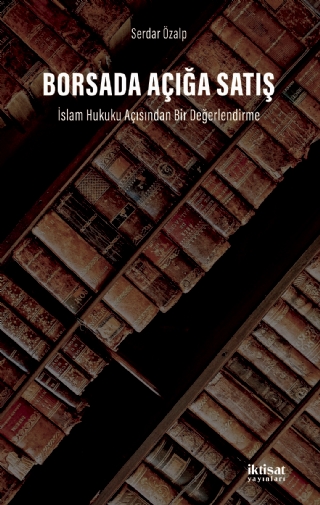
The stock market, which contains many transactions and applications, is important for Islamic economic studies.
As a matter of fact, the stock market, in terms of having shares, debt instruments, futures and options, precious metals and precious stones markets and many products and contracts belonging to these markets it has a rich structure in terms of subject for Islamic economic studies. Although the transactions applied in the stock market are based on a legal basis, the implementation of these transactions brings with it many fiqh issues and problems. The same is true for the short selling transaction, which is one of these transactions. Because the short selling process includes many fiqh issues. For this reason, the aim of the study is to reveal the technical implementation of the short selling process in the stock market.
and to make a fiqh evaluation.
The book deals with the aspects of short selling as a financial product that need legal analysis. In this regard, the subject; It examines the subject, purpose, importance, method and resources of the research in three parts together with the introduction part. In the first chapter, various concepts that can be encountered in short selling transactions are included and the issues that arise in the jurisprudence evaluation of the transaction are briefly touched upon. In the second part of the research, the definitions made for the short selling transaction are classified and discussed, and then the detailed application of the transaction, its types and its economic effects on the market are mentioned. In the third part, four subjects determined in terms of fiqh are discussed.
The evaluation of the process in terms of Islamic law is given.
The book constitutes an important contribution to the Turkish literature, especially considering the lack of a Turkish study dealing with the fiqh aspect of the subject.
As a matter of fact, the stock market, in terms of having shares, debt instruments, futures and options, precious metals and precious stones markets and many products and contracts belonging to these markets it has a rich structure in terms of subject for Islamic economic studies. Although the transactions applied in the stock market are based on a legal basis, the implementation of these transactions brings with it many fiqh issues and problems. The same is true for the short selling transaction, which is one of these transactions. Because the short selling process includes many fiqh issues. For this reason, the aim of the study is to reveal the technical implementation of the short selling process in the stock market.
and to make a fiqh evaluation.
The book deals with the aspects of short selling as a financial product that need legal analysis. In this regard, the subject; It examines the subject, purpose, importance, method and resources of the research in three parts together with the introduction part. In the first chapter, various concepts that can be encountered in short selling transactions are included and the issues that arise in the jurisprudence evaluation of the transaction are briefly touched upon. In the second part of the research, the definitions made for the short selling transaction are classified and discussed, and then the detailed application of the transaction, its types and its economic effects on the market are mentioned. In the third part, four subjects determined in terms of fiqh are discussed.
The evaluation of the process in terms of Islamic law is given.
The book constitutes an important contribution to the Turkish literature, especially considering the lack of a Turkish study dealing with the fiqh aspect of the subject.

Growth is the most basic phenomenon that we encounter in all areas of life in the capitalist model. Because the model based on supply has indexed its sustainability to growth. In order to spread and sustain the capitalist codes of the system, societies are also organized with the motivation of growth and with rational or irrational codes according to the period. But this ideal, which the masses and societies are dragged after, is a cheap fiction and illusion. Because capitalism is a model of withholding. Growth is only the growth of the capitalist, and its benefits are denied to others. The treatise of utility reconsiders the theory of utility from the perspective of Islamic economics with its concrete (material) and intangible (spiritual) aspects. On the basis of production-consumption indivisibility, the author proposes a solution to the problem of the distribution of the produced income of capitalism with the principle of effort. The work, Hâce Yûsuf b. With the imagination that Ayyub al-Hamedânf placed on the theory of Rötbetü'l Hayat, he explains the economic structure of the utility dimensions ignored by capitalism with mathematical relations. While discussing the philosophical background that feeds the utility theory in the work, the details of the common set of fitra are examined. At the same time, while the financial intermediation paradigm is being questioned, determinations on the collective role of Islamic economic institutions are included.

In this book, which is the seventh book in the Pocket Books series, which covers the basic institutions and issues of Islamic economics, the subject of environment and ecology has been tried to be explained in a content that can be easily understood by people of all levels, rather than a theoretical depth. Today, capitalism is largely abstracted from moral values. It sees the damages as human, global warming and environmental disasters. Islamic economics, which is shaped within the framework of the principles of the religion of Islam, rises as an alternative to these corrupt production relations based on exploiting human and nature. According to the religion of Islam, the vicegerent of Allah on earth is man. According to the human model defined by Islamic economics, which is shaped within the framework of Islamic principles, nature should be seen as a trust from the creator, all living and non-living beings should be respected, and economic activities with ethical values should be carried out, not production-consumption oriented. In this sense, the book approaches the subject of ecology and environment from the perspective of Islamic economics and offers solutions on the subject.

In this work, which is the fifth book of the Pocket Books series, which covers the basic institutions and issues of Islamic economics, the subject of value is tried to be explained in a content that can be understood by people of all levels, together with its theoretical and practical dimensions. In today's world, an economic understanding that we call capitalism, which has become global, seems to be universal and without alternatives, is dominant. Therefore, as people born into the modern world, we establish our economic relations within the limits set for us by capitalist production, consumption and distribution techniques. We think that we have no alternative but to speak the language of the dominant economic understanding and produce practice. We can attribute a suprahistorical role to these concepts by ignoring that the settlement of some concepts in the society in this created language has a historical process and context and that they continue to undergo a continuous change and transformation of meaning. This attitude makes us passive in economic relations and ties our hands in the construction of alternative economic systems. This work is part of the Pocket Books series based on the reinterpretation of basic concepts in economics. With this study, which deals with the concept of value, one of the most important concepts of economics, the meaning of a "value-free" economic thought based on unquestioning acceptance for many of us, the effect of this thought on our daily relations and the construction of a value-laden economic system beyond the current economic understanding. starting points are discussed.

Islamic economy/economics, which emerged as a concept in the 1930s, started to develop theoretically after the 1970s and became an academic field of study. This work presents the positions of the basic micro and macro issues of economics in this new field of study, both theoretically and
It is intended to demonstrate in practical terms. In this context, subjects such as methodology, political economy systems, state-market relations, fiscal and monetary policy, consumer and producer analysis, institutions are included. This book, which is structured to be used as an introductory one-semester course book in Islamic economics in terms of subject progression and segmentation, is also preferable for anyone interested in the subject because it does not have a heavy academic language. With the hope that it will contribute to the field as an original work written in Turkish, as well as related translation works published by İktisat Publishing until today...
It is intended to demonstrate in practical terms. In this context, subjects such as methodology, political economy systems, state-market relations, fiscal and monetary policy, consumer and producer analysis, institutions are included. This book, which is structured to be used as an introductory one-semester course book in Islamic economics in terms of subject progression and segmentation, is also preferable for anyone interested in the subject because it does not have a heavy academic language. With the hope that it will contribute to the field as an original work written in Turkish, as well as related translation works published by İktisat Publishing until today...

In this book, which is the eighth book in the Pocket Books series, which covers the basic institutions and issues of Islamic economics, the subject of utility is tried to be explained in a content that can be easily understood by people of all levels, rather than a theoretical depth. The book examines the meaning, role and importance of the concept of utility in modern economics and Islamic economic theory, taking into account the evolution of the concept over time. Accordingly, the book is organized into four parts. In the first part; The approach in which utility is defined as the ability of goods to meet human needs is discussed. In the second part; The approach in which benefit is defined as the satisfaction, pleasure and happiness obtained from the consumption of goods and services, that is, the "cardinal approach to benefit" has been examined. In the third part; The modern approach to the concept of utility, the "ordinate to utility" approach, in which utility is included in the analysis as a way to rank consumer preferences, is explained. In the fourth chapter, the framework of the concept of utility in Islamic economics is drawn and its differences from mainstream economics are explained.
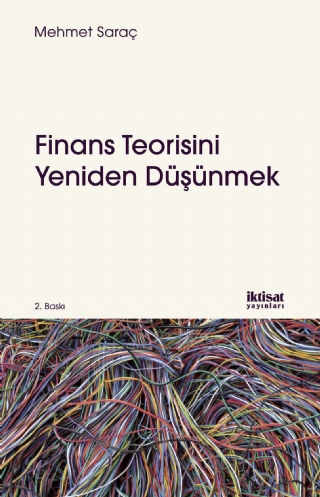
While the theoretical questioning of finance, which is a relatively young specific field among the sciences, is actually being questioned, the world view and human perception on which neoclassical economics is based, and perhaps beyond that, neoclassical economics is also questioned. While doing this, the source of knowledge, the methodology of science, how the Enlightenment process gave direction to these issues and the future of the concept of scientific knowledge are also included in the discussion to a certain extent.
Today, the most questionable point of conventional economics and the finance discipline derived from this understanding is that the epistemology of the economics and finance understanding and the assumptions on which it is based do not fully grasp the reality of human and existence. For this reason, post-modern humanity struggles with crises, cannot establish a sustainable economic system and is deprived of a fair distribution of wealth. This book deals with the debates, critical views, new trends and new paradigm searches, which have become more evident especially after the crises, regarding the theory of finance as a scientific field of study and the global financial system in terms of practice.
Today, the most questionable point of conventional economics and the finance discipline derived from this understanding is that the epistemology of the economics and finance understanding and the assumptions on which it is based do not fully grasp the reality of human and existence. For this reason, post-modern humanity struggles with crises, cannot establish a sustainable economic system and is deprived of a fair distribution of wealth. This book deals with the debates, critical views, new trends and new paradigm searches, which have become more evident especially after the crises, regarding the theory of finance as a scientific field of study and the global financial system in terms of practice.
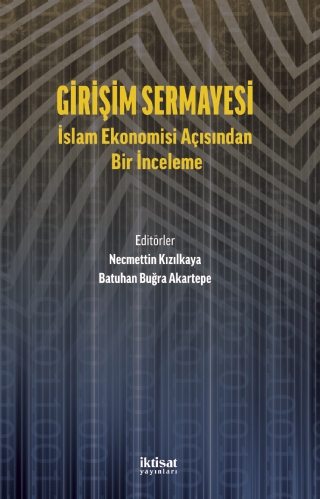
There have been people who are creative and have new ideas throughout history. These ideas led to the development of alternative models outside of the ongoing economic habits and opened the door to innovations.
Today, many innovations, especially in the field of technology, emerge as a result of the maturation of such ideas. Venture/venture capital is an important financial instrument in this respect, which refers to being a partner in these initiatives in order to meet the funding needs of individuals and companies with new ideas. It is an important feature of this partnership that one party takes the risk and aims to earn long-term returns by putting forth the capital of the other party and the creative thinking of the other party. In this respect, venture capital is an alternative model different from classical financing models. The profit-loss-based partnership structure in venture capital is suitable for the objectives that Islamic Economics wants to achieve. For this reason, it is an important investment tool that public and private institutions, universities and companies can apply, especially participation banks. This book in your hand examines the history, current situation, legal structure, economic opportunities, tax and accounting dimensions of venture capital. In this respect, it aims to fill an important gap in this issue, which has been neglected in terms of both theory and practice.
Today, many innovations, especially in the field of technology, emerge as a result of the maturation of such ideas. Venture/venture capital is an important financial instrument in this respect, which refers to being a partner in these initiatives in order to meet the funding needs of individuals and companies with new ideas. It is an important feature of this partnership that one party takes the risk and aims to earn long-term returns by putting forth the capital of the other party and the creative thinking of the other party. In this respect, venture capital is an alternative model different from classical financing models. The profit-loss-based partnership structure in venture capital is suitable for the objectives that Islamic Economics wants to achieve. For this reason, it is an important investment tool that public and private institutions, universities and companies can apply, especially participation banks. This book in your hand examines the history, current situation, legal structure, economic opportunities, tax and accounting dimensions of venture capital. In this respect, it aims to fill an important gap in this issue, which has been neglected in terms of both theory and practice.
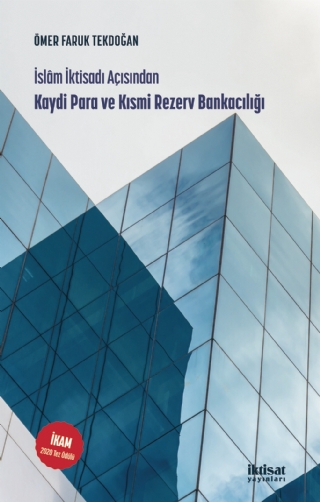
The partial reserve system, which we can call the basis of modern finance, has been the subject of discussion from past to present due to its weak structure, the role it played in economic instability and the problems it created. This interest-based system, which ensures that most of the money supply is dematerialized, has led to a macro-ribâ system that envelops economic life. The full reserve system, which was developed as an alternative to this system, could not find its place in practice. From the point of view of Islamic economics, the fact that the current system is riba-oriented and causes an unfair distribution of resources has necessitated the evaluation of the alternatives put forward from this perspective. The fractional reserve system operates based on confidence that commercial banks and central banks will provide sufficient liquidity when needed, and thus in essence it is prone to financial crises.
is weak and fragile. From this perspective in the book, the problems that are claimed to arise in economies with the discovery of fractional reserve banking are examined, the applicability of full reserve banking and how sufficient it is for a solution are examined, and the suitability and drawbacks of both systems in terms of Islamic economics are discussed. In addition, the effect of both banking systems on economic stability was compared using an agent-based simulation model.
is weak and fragile. From this perspective in the book, the problems that are claimed to arise in economies with the discovery of fractional reserve banking are examined, the applicability of full reserve banking and how sufficient it is for a solution are examined, and the suitability and drawbacks of both systems in terms of Islamic economics are discussed. In addition, the effect of both banking systems on economic stability was compared using an agent-based simulation model.
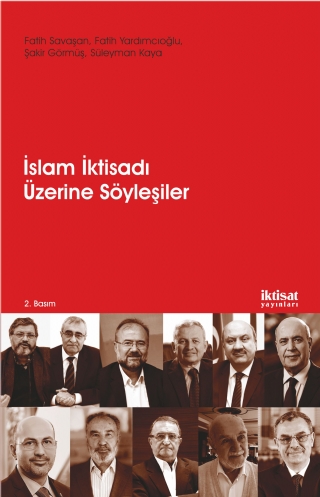
Many issues such as what the economic view of Islam is, whether it offers an economic system, what solutions it provides to people's needs, and through which institutions historically Muslims carry out their economic activities have been discussed by different segments for a long time and still continue to be discussed. Not only theoretical efforts, but also many practical efforts have been put forward and institutions have been established. Sometimes the practice side, led by Islamic banks, directed other theoretical studies, and sometimes the theory tried to influence the practice. On the other hand, with the growth of Islamic finance, regulatory authorities have inevitably been included in this ecosystem. In the end, many stakeholders, interconnected or not, ponder on Islamic economics and finance and contribute to keeping this field on the agenda.
Studies in the field of Islamic economics and finance have increased for Turkey, especially after the 1980s. Islamic lawyers, employees in the Islamic finance sector, regulatory agencies, academics and many more contribute to the field. Among them, some names played leading roles in their own fields and have been influential in the reaching of Islamic economics and finance to a much wider audience today. This book consists of interviews with professors who have worked in this field for many years, industry representatives and regulators operating in the field of Islamic finance.
Studies in the field of Islamic economics and finance have increased for Turkey, especially after the 1980s. Islamic lawyers, employees in the Islamic finance sector, regulatory agencies, academics and many more contribute to the field. Among them, some names played leading roles in their own fields and have been influential in the reaching of Islamic economics and finance to a much wider audience today. This book consists of interviews with professors who have worked in this field for many years, industry representatives and regulators operating in the field of Islamic finance.
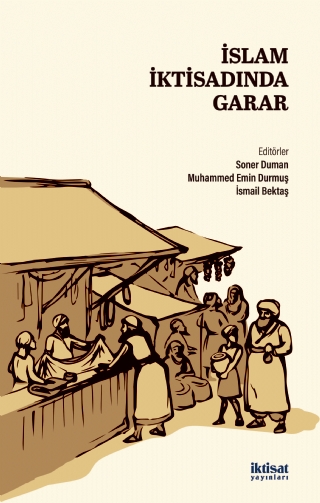
The most basic principles that Islam observes in human relations; observance of justice, prevention of injustice, ensuring social stability, entrusting the trust to those who are competent, open and transparent relations between people, preventing transactions and dispositions that may lead to conflicts between people. These principles also guided the instructions of Islam regarding commercial relations between people. In this context, tortious acts such as theft and extortion are prohibited, as well as interest, verbal or de facto cheating that leads to the exploitation of one party in contracts.
Garar, which is the subject of this book, is also prohibited because it causes commercial relations between people to be carried out in an open and transparent manner and cause conflicts and fights between people. The book consists of the papers presented in the workshop named "Garar in Classical Fiqh and Its Effect on Today's Economic Transactions", which was organized with the aim of addressing many aspects of the ban on garar, which was discussed in the classical fiqh literature and also encountered in modern economic transactions, by the participants, which were developed and converted into articles. This book, in which different authors deal with the prohibition of garar in Islamic fiqh from conceptual, intellectual and methodological perspectives, has been brought together in order to establish a solid link between our classical fiqh heritage and today's economic affairs.
Garar, which is the subject of this book, is also prohibited because it causes commercial relations between people to be carried out in an open and transparent manner and cause conflicts and fights between people. The book consists of the papers presented in the workshop named "Garar in Classical Fiqh and Its Effect on Today's Economic Transactions", which was organized with the aim of addressing many aspects of the ban on garar, which was discussed in the classical fiqh literature and also encountered in modern economic transactions, by the participants, which were developed and converted into articles. This book, in which different authors deal with the prohibition of garar in Islamic fiqh from conceptual, intellectual and methodological perspectives, has been brought together in order to establish a solid link between our classical fiqh heritage and today's economic affairs.

Murabaha contract is one of the most applied and discussed transactions in the interest-free financial system. In the process that has been going on since the 1970s, when interest-free banking began, the subject of murabaha, which has been in the field of interest of many scientific disciplines, especially fiqh and economics, has been an issue that has attracted the attention of the academic community as well as being important for the real sector. The main purpose of this study is to deal with the historical development of such a contract, to follow the stages it went through and to examine the debates about the problematic points it has.
Murabaha, which is known as "production support" and "corporate and individual financing support" in practice in Turkey, is a larger-scale and most widely used transaction today, has common issues with other investment-financing models, as well as many different The fact that it contains a problem point, is the most discussed transaction in the modern period, and shows how a classical contract was modernized are the factors that make this contract important. Murabaha fiqh, economic, social, etc. This study, which aims to address various aspects with a critical and holistic perspective and to reveal the course of reasoning and judgment-making activities in modern Islamic economics problems based on the existing literature, is a candidate to fill an important gap in the literature.
Murabaha, which is known as "production support" and "corporate and individual financing support" in practice in Turkey, is a larger-scale and most widely used transaction today, has common issues with other investment-financing models, as well as many different The fact that it contains a problem point, is the most discussed transaction in the modern period, and shows how a classical contract was modernized are the factors that make this contract important. Murabaha fiqh, economic, social, etc. This study, which aims to address various aspects with a critical and holistic perspective and to reveal the course of reasoning and judgment-making activities in modern Islamic economics problems based on the existing literature, is a candidate to fill an important gap in the literature.
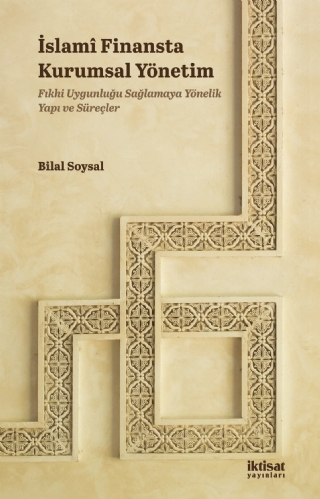
For an Islamic financial institution to survive and grow, it is essential that all stakeholders adopt a corporate governance approach to increase their trust in the institution. An effective corporate governance is necessary for an Islamic financial institution to manage the risk of non-compliance with Fiqh principles and rules, to grow in a healthy way, and to properly protect the interests of all stakeholders. In this context, an important part of corporate governance in Islamic financial institutions is an effective "Fiqh Compliance Management System" aimed at ensuring the compliance of activities with fiqh principles and rules. This book explains the Fiqh Compliance Management System in Islamic financial institutions in detail within the framework of literature and international standards, and the approaches of countries to the subject. it reflects in the context of legal regulations and reveals the situation of Turkey compared to other countries.

This work examines the concepts of property, property and market, which are the main subjects of economics, from the perspectives of both Islamic and conventional economics. Goods are the basis of economic life, because goods are the name of the means that meet the needs of people. Man has material and intangible needs. A person pursues them all his life. If his material needs are met, he will be prosperous, and if his intangible needs are met, he will attain happiness. People try to acquire property from the moment they know themselves. The name of owning and owning a property is called property. Property entitles people to that property and provides the right to dispose and use it. This is also called "possession". Normally, people buy the goods by giving their money. The sale process is also done in the bazaar, in the market. The word market, which comes from Italian, is used in the sense of market. The movable goods are both displayed and sold in the bazaars, shops, week markets, stock exchanges, formerly fairs and now fairs. Real estates are bought and sold in the land registry offices of the state.
In this work, the author analyzed the definition and properties of goods, their moral evaluation, the subject of ownership, the ownership of production factors, and the protection of property, both from a secular and Islamic point of view, in his six-part analysis.
In this work, the author analyzed the definition and properties of goods, their moral evaluation, the subject of ownership, the ownership of production factors, and the protection of property, both from a secular and Islamic point of view, in his six-part analysis.

In this book, the changing economic financial conditions in the Ottoman Empire after the declaration of the Tanzimat Ferman, both in terms of its content and social, legal and economic influence, were shaped around the idea of establishing a bank, which was one of the new practices for that period. As a matter of fact, the idea of 'establishing a state bank' for the Ottomans and the dynamics and intellectual infrastructure of its implementation is an important economic history event that needs to be examined.
This book in your hand examines the organizational characteristics of Dersaadet Bank, the first example of the Ottoman banking activities started in the second half of the 19th century, and the economic conditions of the period in which it started to operate, as well as the financial and commercial dimensions of its mission, with the help of Ottoman archive sources. This study has tried to show how the trade and business networks of the Tanzimat Period were shaped through financial markets, the nature of the entrepreneurial networks owned by the partnerships of merchants and bankers, and what features they contain in this sense, through the records of Dersaadet Bankası. This book, which can be considered as an essay on the purpose of the bank's establishment, the close relationship of the policy transactions it carried out with foreign trade and the Ottoman monetary system, and the revealing of the Ottoman entrepreneurial business networks through this experience, gives the reader a thematic overview of the 'Ottoman History of Economics, Business and Finance' literature. offers pain.
This book in your hand examines the organizational characteristics of Dersaadet Bank, the first example of the Ottoman banking activities started in the second half of the 19th century, and the economic conditions of the period in which it started to operate, as well as the financial and commercial dimensions of its mission, with the help of Ottoman archive sources. This study has tried to show how the trade and business networks of the Tanzimat Period were shaped through financial markets, the nature of the entrepreneurial networks owned by the partnerships of merchants and bankers, and what features they contain in this sense, through the records of Dersaadet Bankası. This book, which can be considered as an essay on the purpose of the bank's establishment, the close relationship of the policy transactions it carried out with foreign trade and the Ottoman monetary system, and the revealing of the Ottoman entrepreneurial business networks through this experience, gives the reader a thematic overview of the 'Ottoman History of Economics, Business and Finance' literature. offers pain.
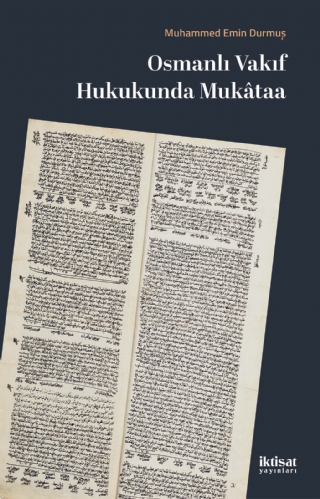
The concept of mukâtaa is used to express practices that have different legal consequences in foundation law, as in Ottoman financial law. In this study, the focus is mainly on the practice of mukataa, which means renting the foundation land to anyone who wants to build a building or plant a tree, with the right of decision and ownership of it. The foundations of the mukâtaa practice date back to before the Ottoman Empire, and the Ottomans further developed this practice, which they inherited, with some arrangements and used it for centuries. However, Ottoman lawyers, who saw that the mukâtaa practice caused the abuse of foundations over time, did not insist on this practice, on the contrary, they developed the more advantageous icâreteyn practice for foundations. This shows that mukataa paved the way for the practice of icareteyn. In this book, the historical background, nature, different practices, conditions, legal principles and rights of the mukataa contract in the 16th and 17th centuries have been tried to be revealed, especially based on fatwa journals and sharia registers.

"My word ends here. Praise be to Allah. All my wish, supplication and prayer is that God Almighty bestows goodness on this servant of mine and that he attains His Divine consent. Inshallah. Amen." The book in your hand presents a concise framework to get to know Sabahaddin Zaim better, who completed the memoir in the form of a memoir. The book is eye-opening for those who are curious about firstly good morals, then useful science equipped with good morals, and finally someone who carries his useful knowledge to the level of sincerity and righteous deeds.

In this sixth book of the Pocket Books series, which aims to deal with the basic institutions and issues of Islamic economics in a content that can be easily understood by people of all levels, rather than a theoretical depth; The issue of saving, which has not received the attention of Islamic economics researchers, has been handled not only from an economic point of view, but also from a multifaceted perspective in terms of social, legal, moral and cultural aspects.
Despite its small volume, the work reveals the current state of Islamic economic studies through the concept of savings, and invites the reader to a modest search for the political economy of Islam from the crossroads of thought on the question of how the savings phenomenon can be shaped in Islamic economy.
Despite its small volume, the work reveals the current state of Islamic economic studies through the concept of savings, and invites the reader to a modest search for the political economy of Islam from the crossroads of thought on the question of how the savings phenomenon can be shaped in Islamic economy.

When we look at the world in general, not only conventional banks but also interest-free banks finance international (foreign) trade. Conventional banks can finance all kinds of legal goods or services with interest. Interest-free banks, on the other hand, can only mediate for goods that are halal to trade while financing international trade, and they can provide financing to international traders only with interest-free financing products. This book in your hand focuses on various interest-free financing products of interest-free banks and which interest-free financing products can support international traders. Thanks to this book, the reader will have the opportunity to learn about the development of international trade in our nearby geography, to get to know the interest-free institutions that support international trade, the types of contracts used in interest-free financing, and the current interest-free international trade finance products that have applications around the world.

The foundation is a very important institution that takes its essence from the understanding of charity and infaq in Islam, has developed and enriched with the experiences of Muslims in the historical process, and covers almost all areas of life with the purposes it serves. Islam, on the one hand, obliges Muslims to perform obligatory sadaqah (sadaka-i vâcibe) such as zakat, alms, and tithe, on the other hand, encourages them to do voluntary sadaqah (sadaka-i nafilah). Among these futile types of charity, the foundation has followed a very important development course in history in terms of institutionalism, prevalence and the purposes it serves. The freedom of the person who established a foundation to set a purpose for his foundation has revealed a wide variety of purposes in foundations over time. Indeed, this diversity of aims has been well documented and demonstrated in historical studies.
This book approaches the issue of purpose in the foundation from a different perspective, deals with the issue in a legal framework and tries to draw a theoretical framework for the purpose of the foundation.
This book approaches the issue of purpose in the foundation from a different perspective, deals with the issue in a legal framework and tries to draw a theoretical framework for the purpose of the foundation.
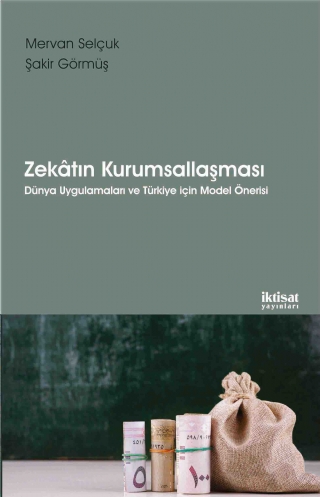
The connection of Muslims with zakat has decreased day by day and has almost reached the breaking point. It is seen that there is a decrease in the number of people who calculate zakat in accordance with its originality and deliver it to those who deserve it. While the zakat potential of Islamic countries can easily eliminate the problems of income distribution and poverty, the insufficient institutionalization of zakat causes many socio-economic problems and an inability to effectively combat existing problems. Hz. Although it cannot be collected and distributed under the authority of the state and forcibly, as in the Sunnah of the Prophet (pbuh), it is seen that zakat is tried to be implemented in an institutional structure with state support in countries such as Malaysia, Indonesia and Pakistan. In this study, information about the countries where zakat is applied in an institutional structure is given and these zakat institutions are examined comparatively. In the light of this information, taking into account the existing legal and institutional structures, a model has been created for a modernly applicable zakat institution in Turkey.
